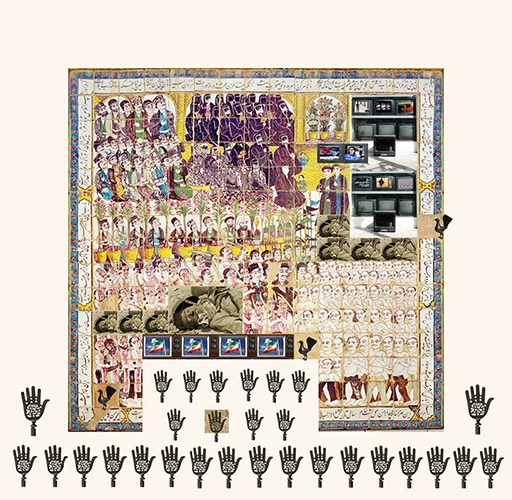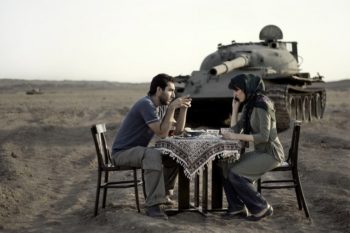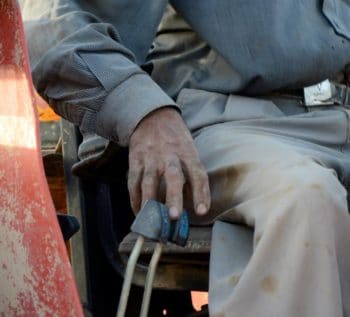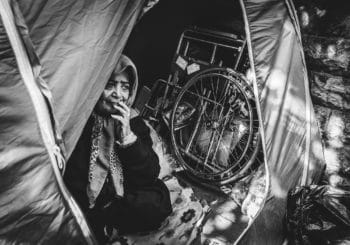Dear Friends,
Greetings from the desk of the Tricontinental: Institute for Social Research.
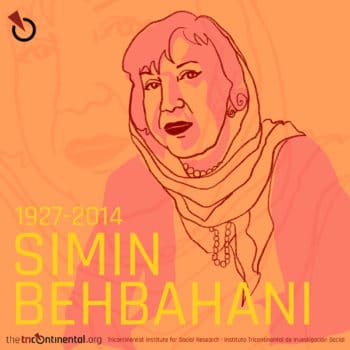 Word comes from friends in Iran of foreboding, a general sense of fear that the United States might bomb the country at any time.
Word comes from friends in Iran of foreboding, a general sense of fear that the United States might bomb the country at any time.
A friend in Tehran asks me to read Simin Behbahani’s The World is Shaped Like a Sphere, a poem for our times. Behbahani (1927-2014), a superb lyricist, wrote this poem in 1981 (translated by Farzaneh Milani and Kaveh Safa):
It was our agreement to call this the East,
though we could push it westwards, with ease.
Don’t speak to me of the West, where the sun sets,
if you always run after the sun,
you will never see a sunset.The world divided by a line is a dead body cut in two
on which the vulture and the hyena are feasting.
Iraq–at the behest of the Arab Gulf and the United States–had attacked Iran in 1980, inaugurating a futile war that would go on till 1988. Angry that the Gulf Arabs had not properly financed the war nor honoured the sovereignty of Iraq’s oil fields, Iraq’s Saddam Hussein attacked Kuwait in August 1990. It is worth recalling that in the summer of 1990, the Gulf Cooperation Council (GCC)–set up out of anxiety for the Iranian Revolution of 1979–hastened to normalize relations with Iran. Kuwait resumed flights to Iran and linked investment and shipping deals with Iran. The GCC, which had egged Saddam to attack Iran, now seemed to curry favour with Iran against Iraq. The blood of Iraqis and Iranians stained the long border between those two countries; the people of both countries had been treated as pliable marionettes by the Gulf Arabs and the West. Iraq’s invasion of Kuwait started the Gulf War, which does not seem to have ended. Today, the Gulf War manifests itself in the fierce siege against Iran.
Iran sits at the precipice of disaster. U.S. President Donald Trump’s harsh sanctions and his threats of war send shockwaves through the region. Buyers of Iranian oil have decided to wait and see how the situation unfolds. The key player here is China. How China will react defines the next stage, as I write in my column. All is tense. Shahram Khosravi, an anthropologist, wrote a moving account of a conversation with his friend Hamid–a veteran of the Iran-Iraq War. Our newsletter this week features Shahram’s account, a window into the life of one Iranian rattled by the sanctions and by the premonition of war. It is below:
In Iran, the term ‘war’ is often used in reference to the U.S. sanctions. ‘Why don’t they [the U.S.] leave us in peace?’, asked my friend Hamid late last year.
Hamid and I were both born in 1966 in the same village along the Zagros mountains in the Bakhtiari region of southwestern Iran. At nineteen, Hamid was sent to do two years of compulsory military service. The Iran-Iraq War was in its fourth year. Hundreds of thousands of young men, many teenagers, had already been killed. After ten days of training, Hamid went–Kalashnikov in hand–to the front. On a cold February day in 1986, the gates of hell opened. Saddam Hussein’s forces unleashed mustard gas on the Iranian troops. Twenty thousand died immediately, while an additional 80,000 survivors suffered—and many continue to suffer—the impact. Hamid’s lungs were badly damaged; he cannot talk without coughing. His skin is burnt in many places. He suffers from depression.
Hamid blames the U.S. and the Iraqi government for his injuries. He is right. Recent CIA documents confirm U.S. complicity in the use of mustard gas on young people like Hamid. Now the U.S. sanctions have become harsher. As a temporary labourer, Hamid can barely tolerate the unbearable economic pressure of the sanctions on his weak shoulders.
Trump withdrew the U.S. from the Iran nuclear deal in May 2018. Three months later, the first shockwave hit Iranians. Iran’s currency collapsed by 70%, causing high inflation. The cost of basic needs went up. Workers’ purchasing power dropped by 53%. A kilogramme of meat costs more than the entire day’s wage of a worker.
Sanctions have shrunk the official corridors of trade, opening up space for informal trade networks and various forms of smuggling. The weak Iranian currency has meant the widening the price of goods inside and outside of Iran. Livestock is increasingly being smuggled into Iraq, which is a key factor in the rising price of meat. As sanctions increased, so did cross-border smuggling. One study suggests that this smuggling has increased by thirty-seven times its pre-sanctions frequency.
Medicines are exempt from the sanctions, but they are nonetheless scarce and expensive. Companies that sell medicines to Iran shy away from the unstable economic situation and fear retribution from the United States. Sanctions target shipping and banking, making it hard to get the medicines to the country and pay for them. Insecure markets are a good business environment for speculators, who buy and hoard medicines, forcing prices upwards.
Foreign investments collapsed, and capital fled the country. An official source says that since the summer of 2017, about U.S. $20 billion has left Iran. Companies have also fled, which means that parts for machinery and cars cannot be easily sourced. Production of vehicles has fallen by 72%.
Unemployment has increased. Workers are often told by their employers that they cannot get paid because ‘there is no money anywhere’. The informal sector has grown, with precarious jobs without health and unemployment insurance becoming the norm.
Hamid has been in the informal sector for decades. He rarely gets paid in time. Not getting paid on time is now normal–often with six months of salary in arrears. Each week, workers somewhere in Iran go on strike to demand their salaries. Delayed salaries mean workers have to take out loans to meet their basic needs. Less fortunate people turn to usurious moneylenders (who charge interest rates at 70%). The interest eats into their unpaid salaries. The U.S. sanctions have cut their lifeline. They are drowning.
While Hamid–in a small village–struggles to survive, middle-class Iranians seek a way to flee the country. I have never seen such widespread desire to leave the country. People from the middle-class do not see any future in Iran. Lines outside European embassies are getting longer and longer, as announcements of property auctions ‘due to emigration’ are getting more common. Buyers are few. The ‘bazaar is sleeping’, people say. ‘Nothing happens now. No one sells, no one buys’.
Hamid says, ‘When the dollar’s price goes up, the price of everything goes up: tomato, rice, meat, medicine– everything. They never come down, even if the dollar’s price goes down’.
‘Iranians’, it is said, ‘have become like calculators’. Life is filled with numbers. Following the exchange rate of the dollar has become an obsession. Everyone waits to find out where the Rial–Iran’s currency–will settle. The structure of social life is suspended. Hamid checks the dollar’s price each day. Far from his village, Donald Trump tweets about the war against Iran. On 19 May, Trump threatened Iranians with an ‘official end’–a threat of extermination. When he does so, the Rial responds and Hamid sees and feels the impact. Sanctions and Trump’s threats cast a shadow of death, even as no gun has yet been fired. Premature death is so frequent that it is now seen as normal. Iran has become preoccupied with death due to the sanctions and the rhetoric of war. Shortages of medicines have already killed people.
So have plane crashes. In 1995, U.S. President Bill Clinton put sanctions against Iran’s civilian aviation industry. This prevented Iran from buying new aircraft and spare parts. Iran’s dozen airlines have the oldest fleets in the world. In February 2018, an Aseman Airlines flight with 66 on board crashed in the Zagros mountains–not far from Hamid’s village.
Hamid worries for his son, Omid, now age 19. ‘If they start a new war….’, he says, and then stops, his eyes down, coughs overcoming him. He has seen how wars break bodies and souls. If the U.S. felt no compunction in providing Iraq with chemical weapons to use against Iran in the 1980s, why would they not allow Saudi Arabia and Israel to do the same now? Our generation was gassed by the U.S.-backed Saddam Hussein. Is it now Omid’s generation turn to break down under the harsh sanctions and the shadow of American bombers?
A war against Iran–as Hamid says–will be catastrophic, not only for Iran but for Eurasia. It would divide the world into two, vultures and hyenas feasting on both halves.
Warmly, Vijay.

